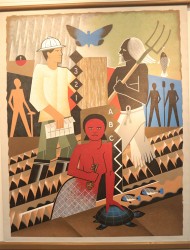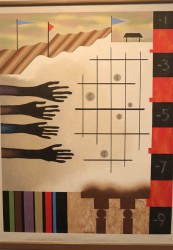By Mark McGowan
with photos by Arian Browne
Stanley Greaves is not your typical artist. In fact, he tries to avoid being labelled as one since he feels the term ‘artist’ has many popular conceptions and misconceptions which do not accurately reflect what he does. “You have to define yourself,” he says, while emphasizing the importance of not having people label you.
Greaves refers to himself as a “maker of things”; “I have always been making things,” he says.
This skill at making things has led to his paintings, sculptures, poems and other creations gaining him widespread recognition both regionally and internationally. But this did not happen overnight. It was a process which started in childhood when partly due to the influence of his father, he started making things. And more than seventy years later this process of “making things” continues.
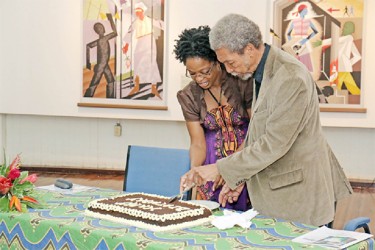
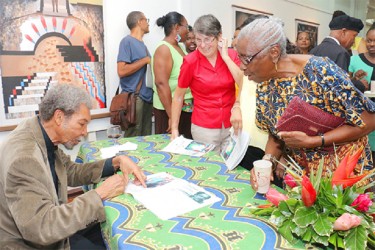
Greaves, who now lives in the USA, came to Guyana last month and engaged in several projects. An exhibition of his paintings ‘Dialogue with Wilson Harris’ was held at the National Art Gallery. He told Stabroek News that this exhibition was the fruition of an idea he first had in 1964. This is testimony to the “great deal of patience and stamina” which he believes is essential for a successful career in art.
Underscoring the virtues of patience, Greaves said that while he had wanted to study art since the age of 16, he did not get to do so until the age of 26. During this waiting period he read a lot of books and practised art, particularly as a member of the Working Peoples’ Art class. This sort of exposure, he said, was extremely beneficial since when he eventually attended Newcastle upon Tyne University in Britain, he had already been exposed to much of what he was being taught. What he benefited immensely from was the opportunity to visit the big museums in the UK and some in other parts of Europe, including Italy and France. Several years later he continued his studies at Howard University, in the USA on a Fulbright Scholarship.
“An artist has to have the eye of God,” Greaves said when asked what are some of the keys to being a successful artist. Awareness on several levels is key. “You are aware of the environment and you are aware of the possibilities of what can/or cannot be done,” he adds. According to him there is nothing like absolute freedom of the artist since throughout life there are constraints whether they be cultural, social or physical. He also believes that good artists discover what holds their interest and pursue it to the fullest.
Art in Guyana has come a long way, according to Stanley Greaves. He remembers the days when art was only practised among the members of a certain social class and the moves to have this change. This was what the Working Peoples’ Art Class attempted to do. There was later the E R Burrowes School of Art and the introduction of a Creative Arts Division at the University of Guyana. Greaves was the first head of this department at UG, serving from 1975 to 1986.
Greaves remembers being called to a meeting to justify the existence of two local institutions training artists. According to him, the meeting lasted very briefly since he explained that the role of Burrowes School of Arts was to train artists, while that of UG was to train individuals who would support the artists. He notes that art has suffered because of the absence of trained art teachers at the primary and secondary levels in this country.
He reflected on his own tenure as a teacher and suggested that as an art teacher he had been “quite unsuccessful.” There were always the constraints of the lack of adequate space and materials. But his experiences take nothing away from his love of teaching. Had he enough money, he said, he would have liked to have run
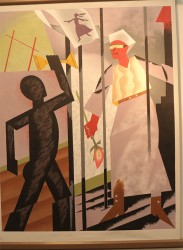
his own school, one that is centred around the child. He believes that you can teach any subject area through any particular area in which the child is interested.
In terms of immediate projects, Greaves hopes to launch his third book of verse soon. This collection will be titled Haiku after the Japanese poetic form. He has won the Guyana Prize for Literature for his first book of poems titled Horizons. His second collection is titled The Poems Man and it was published in 2009.
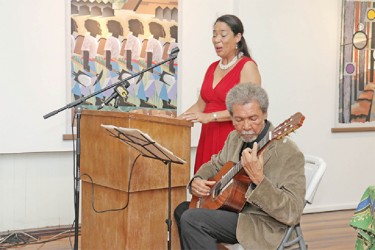
While in Guyana, he intends to hold a poetry reading session, where he and one of his former students, Kathy Henriquo, will be reading the work of some outstanding Guyanese poets.
